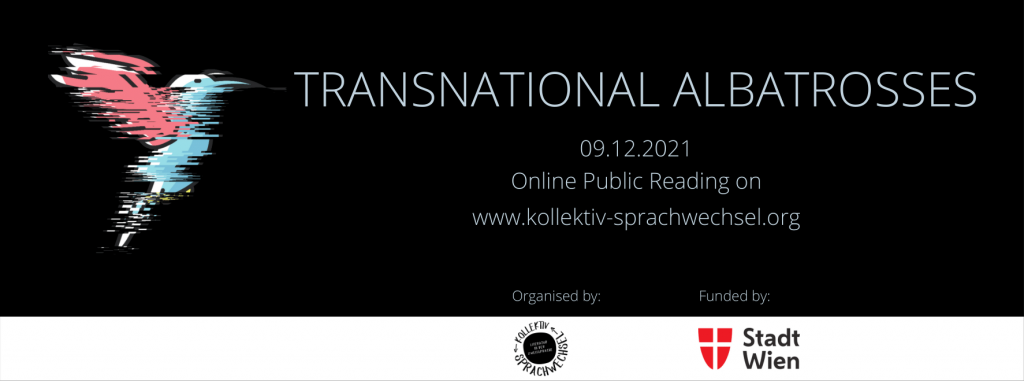
Our kollektiv closes its 2021 program with the series Transnational Albatrosses, a programme that explores the innovative effects second language poetry brings about in the adopted language. We invited poets who write in more than one language based in Vienna and beyond to be part of an online Literary Workshop that took place between November 15th and December 5th, 2021. An Online Public Reading follows on our website on December 9th.
During the Literary Workshop the poets examined in an essayistic/reflexive format questions about how they came to write in a second language and how the language(s) and themselves benefit – or not – from this. The discussions touched upon various topics, such as hierarchies in language, code switching, love (or not) of the dominant or first languages, the perception of our poetry in the public space.
Following the Literary Workshop, the poets created*produced poems and performances that draw on the long distance exchanges. These creative works form the basis of the Online Public Reading that takes place on our website on Thursday, December 9th at 7 p.m.
Fragments of our long distance literary exchanges that took place in the discursive phase:
„But writing… writing? Yeah. NO. No thank you. Nein danke. Ich kann nicht. Ja was ya and don’t even get me started on weg and Weg or wecken, like what and why und sowieso und überhaupt! Bitte? I couldn’t spell well and why the hell were there four cases and who needs cases and what is with der, die, das and what not? And please I just want to write and speak in dialect for the rest of my life.”
Njideka Iroh
So there you go, in a nutshell: language grew up with me in this way. Language here, reality over there on the other side. As if separated by an impassable chasm. Sniffing one another, stalking one another and threatening to undermine each other’s foundation. When I moved to Austria and started to learn German from scratch, I unknowingly packed in my travel bag this relation I developed with language in the first tongue. It wasn’t the adults anymore and I wasn’t the teenager anymore. However, I expected from German to become the same haven of expressivity, the oasis. There was – there is! – no way to meet those expectations. German – and second languages in general, I reckon – don’t work like this. You are always exposed in them, vulnerable. One foot in the chasm. This goes too for this English in which I write to you at the moment, although differently than German. German, because of its proximity and ubiquity (in Vienna where I acquired it) came with a sense of implacableness, whereas English can still swing in an indeterminate space of imagination.
Ovid Pop
I admit, there are more ways to consider hierarchy in the languages we live in, I believe everyone has its own definitions. Outside my intrinsic universe the concepts of dominant language(s) and less regarded languages still exist, of course. Hierarchy exists in the system. But in my own multilingual cosmos I would like to be the authority. I would like to be the one who decides to practice no hierarchy between the languages I speak/write in.
Laura M. Pana
This wish to focus on the inside came about because it has been and maybe still is a long process to try to achieve liberation from the language domination. I think that one of the key moments for me was when I started to give myself permission to simply write in German. I look at it now as a form of self-love, of Philautia.
Embracing my ancestry and origins are crucial to my survival in Austria and lastly made me the Austrian that I am today, claiming that identity as a strategy of resistance against the imposed hegemonial picture of what constitutes „a real Austrian“. I am all these spaces and way more than that. So where does this fit into the five categories of love languages? Well, to me it seems like it does into the three categories I never deemed my favorites. 2. Quality time: because it took my full attention and dedication to understand and embrace the history of my origins and ancestors. 3. Acts of service: because I have done myself a huge service in recognizing that in fact, NOTHING was wrong with how I looked, where I was from or where I lived and took up space, what was wrong is racism and xenophobia.
Enesi M.
A language in whose social order it is enough to either yell loudly or to speak “well” to dominate and erase the voices who would have most to contribute to its vigour in the 21. century, to equity within it, to its beauty, even. When I write in Slovenian – which is still the case for most of my poetry – I do so at least as much against it as I do with and through it.
Uroš Prah
Using a foreign language gives the power of creative constraints: having fewer possibilities, you often must come up with a clever way to use them.
(…)
You cannot lie if you don’t know the truth. In this case, the poet can lie only to themself. Lies make a significant impact on fluency in the language, which is important for stories and poems. Writing in a foreign language is difficult because you have fewer possibilities to express yourself. On the positive side, you can focus more on what your text wants to say. Having fewer expression possibilities allows you to focus more and not fall into the trap of lying to yourself.”
Zoltán Lesi
Transnational Albatrosses is organised by kollektiv sprachwechsel and funded by Stadt Wien Kultur.
